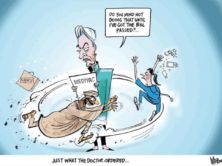
La Maison Radio-Canada in Montréal. (Credit: Jason Paris via Flickr)
The Canadian Broadcasting Corp. has released its investigation into how it handled the Jian Ghomeshi scandal.
Ghomeshi was fired last fall from the CBC as sexual assault accusations against him rose. He has been charged with four counts of Sexual Assault and one count of Overcome Resistance – Choking, as iMediaEthics wrote at the time. Ghomeshi’s lawyer said is he pleading not guilty.
Two executives are out, the Globe and Mail reported — Chris Boyce and Todd Spencer. Both had been “on leave since early January as part of its investigation.”
The CBC’s full investigation by Janice Rubin and Parisa Nikfarjam, employment lawyers for Rubin Thomlinson LLP, is published on its website. CBC said it published the full 52-page report “in the spirit of transparency” but it did redact some information where it “promised confidentiality and/or to comply with our legal obligations.”
Ghomeshi’s “conduct was abusive,” the lawyers wrote, and CBC “failed” in providing a good work environment, handling Ghomeshi, and essentially were “condoning” Ghomeshi’s behavior by not properly addressing problems with Ghomeshi’s unprofessionalism.
“To the extent that there was management intervention, it was limited and ultimately ineffective at dealing with the central issue: that is that Mr. Ghomeshi’s treatment of and conduct towards those with whom he worked as deeply problematic,” the lawyers wrote. “The consequences of management’s failure to adequately act resulted in employees who legitimately felt disempowered and abused.”
Further, Ghomeshi didn’t have a boss with “clear and consistent authority over Mr. Ghomeshi on a day-to-day basis in the workplace.”
In addition to specific recommendations for improvements at CBC, the lawers wrote that “what is needed is a fundamental shift of the thinking, operation and importance of its own workplace rules for all of its employees.”
The lawyers explained: “Our role was to act as an objective and neutral party, and to conduct an investigation that was independent,” the lawyers wrote. “While we are employment lawyers, we did not act as any party’s advocate, nor did we provide legal advice to anyone involved in the investigation, including anyone employed at the CBC or the CBC itself.”
Specifically, the lawyer identified two questions they sought to investigate in their review:
“1. Were there allegations/evidence of inappropriate behavior on the part of Mr. Ghomeshi that pre-dated his termination? In this regard, it was understood that inappropriate behaviour would include not only allegations of sexual harassment, but also allegations relating to the CBC’s respect at work policies and provisions; and
“2. If there were allegations/evidence of inappropriate behaviour on the part of Mr. Ghomeshi, were these allegations known to CBC management, and if so, what actions, if any, did it take in regard to these allegations/evidence? If they were unknown to CBC management, why were they unknown?”
During the five month investigation, the lawyers interviewed 99 people, the report said. Ghomeshi wouldn’t agree to be interviewed but the lawyers said they expected that. “Given the fact that there was a criminal proceeding underway, and a grievance filed, we did not find this response surprising,” they wrote.
Seventeen others wouldn’t agree to interviews as well. Interviews were “entirely voluntary,” the pair wrote. “We did not have the power to summons witnesses, nor did we have the authority to ask witnesses questions under oath.”
The lawyers had “unfettered access in terms of who we could contact,” they wrote.
“We note that our mandate did not include a review and assessment of the overall CBC workplace culture and it was not our intention to interview a specific ‘sample’ of the employee population,” they added. But they suggested “some of the themes” they found may be “applicable” to all of CBC.
Conclusions
“While some witnesses reported having no difficulty working with Mr. Ghomeshi, the majority of the witnesses who worked with him over the course of his career at the CBC described a pattern of behaviour and conduct that fell well below the Behavioural Standard,” the lawyers wrote.
“We have concluded that elements of Mr. Ghomeshi’s workplace behaviour consistently breached the Behavioural Standard,” they added.
The lawyers wrote that Ghomeshi was often “deeply disrespectful to employees” and listed a collection of claims employees made about his behavior including being “persistently late and consistently disrespectful of colleagues’ time,” not giving credit to employees for work, making “demeaning, inappropriate and unwanted” comments about colleagues, and giving “back and shoulder massages” that made colleagues uncomfortable.
“Less prevalent, but still present in a small number of cases, was behaviour on the part of Mr. Ghomeshi that was sexual harassment,” the lawyers wrote, including “sexualized conduct and comment, including physical contact that was known or ought to have been known to be unwelcome and inappropriate.”
In addition to the massages, he “solicited women in the workplace for dates and personal contact” and flirted with guests and colleagues. He also “shared details about his own sex life” to men and women who complained to the lawyers that the information was “too personal, too graphic, and generally unsavoury.”
The lawyers said they didn’t see any “formal complaint” against Ghomeshi but suggested it could have been because Ghomeshi was a “star of the CBC.” Witnesses said they didn’t complain because of “a lack of trust and confidence in the complaint process” and because of is position at the CBC. “We do not find the absence of a formal complaint surprising nor do we find it suggestive that the events the witnesses described did not occur.”
But CBC managers knew about Ghomeshi’s “problematic behaviour” but didn’t properly address it, the lawyers wrote. They knew about his being late, “moody,” “critical and mean,” “difficult and unappreciative,” and over-sharing.
“In some cases, managers with whom Mr. Ghomeshi was directly involved had an inclination that something was wrong, and failed to inquire any further or failed to take adequate steps to stop the behaviour,” they wrote. “In other cases, despite actual knowledge of concerns expressed by employees, Mr. Ghomeshi’s behaviour was often left unexamined, characterized as ‘difficult’ or was accepted as the norm of how hosts were expected to behave. The evidence shows that while Mr. Ghomeshi’s star was allowed to rise, his problematic behaviour was left unchecked.”
Despite that, the lawyers said “we did not find evidence that managers were aware of information relating to sexual harassment, or any complaints or allegations in that regard.” They wrote:
“It would be wrong to conclude that managers did absolutely nothing in the face of the knowledge and awareness that they had. To be fair, the evidence was that over the course of Mr. Ghomeshi’s employment at the CBC, managers did discuss with him his lateness, in particular. However, these discussions were infrequent, informal, and not part of the CBC’s progressive discipline process and, as the evidence shows, were ultimately ineffective.”
The lawyers also pointed out “weak systems and procedures” at CBC that it should improve including:
- “Over-reliance on formal complaints”
- “No system to measure behaviour”
- “Generic training”
The lawyers listed “six specific objectives” that CBC should take on in response to the report:
- “Clarifying behavioural standards and accountabilities
- “Raising awareness of those standards and accountabilities
- “Creating uniform and fair enforcement of behavioural standards and workplace rules
- “Enhancing existing mechanisms for reporting inappropriate workplace behaviour
- “Enhancing channels of communication about employees’ workplace experiences and to obtain data; and
- “Creating an additional system to address overall fairness in the workplace”
The lawyers want CBC to have staff disclose relationships with staff, consider investigating without complaints from staff, train staff on policies, survey staff on “workplace culture and respect in the workplace” periodically, set up a hotline for complaints and hire someone to be an independent “Respect at Work and Human Rights Ombudsperson” to handle complaints and problems about workplace behavior.
This story has been updated throughout 4/16/2015.







Comments Terms and Conditions